'With Bandera into the future'
The Bandera cult, memory warriors, and 'patriotic education' in Ukraine
In case you missed it, here is part one of this series on Banderite “memory warriors,” which expands on an article I wrote for the left-wing German newspaper junge Welt.
In the summer of 1999, several youth organizations in western Ukraine held a special camp dedicated to the memory of Nazi collaborator Stepan Bandera (1909-59) and the fascistic “Banderite” movement that he led. Participants wore shirts that said, “With Bandera into the future,” and met commanders of the Ukrainian Insurgent Army (UPA), the 1940s paramilitary arm of OUN-B that was spearheaded by Nazi collaborators from the Ukrainian Auxiliary Police that largely carried out the “Holocaust by Bullets” in western Ukraine.
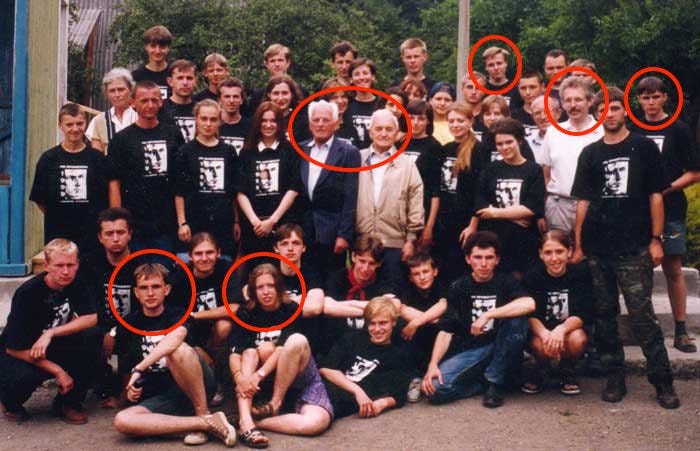
Volodymyr Viatrovych, 22, the future “memory czar” of post-Maidan Ukraine, was the camp commander. Two years later he married Yaryna Yasynevych, who is sitting next to him in the above group photo. Standing in the back is their close friend Andriy Kohut, 19. These young Banderites became leaders of the Center for Research of the Liberation Movement, or TsDVR (Tsentr doslídzhen’ výzvol’noho rúkhu), which the OUN-B established three years later. As readers of part one already learned, after another decade, they became coordinators of the “Civic Sector of Maidan,” which established the Reanimation Package of Reforms (RPR) Coalition in early 2014.
Taras Rondzistyj, also seen above, appears to have already been an important member of OUN-B in Ukraine—but more about him later. Yuriy Yuzych, a Banderite leader of the Plast scouting organization in Ukraine, which more or less rivaled the Ukrainian Youth Association during the Cold War, is seen on the far-right of the group photo. In this case, “Banderite” doesn’t necessarily mean OUN-B member. He did however write a book on the “Plastovyy Character of Stepan Bandera,” and designed the shirts that said “with Bandera into the future.”
Readers may recall that Andriy Kohut was the RPR Coalition’s initial group manager for national memory policy, and Yaryna Yasynevych later joined the board of directors. As for Yuriy Yuzych, he became the “lead expert” on youth policy for the western-funded RPR Coalition, the “largest and most visible reform network” in Ukraine. Meanwhile, Yuzych helped to compile a huge book about Mykola Mikhnovsky (1873-1924), the grandfather of Ukrainian ethnonationalism, for the neo-Nazi publishing house of Marko Melnyk, the first editor in chief of the Azov battalion newspaper, “Black Sun.”
On March 9, 2000, eleven young radical nationalists calling themselves “Independent Ukraine” seized the Communist Party headquarters in Kyiv and assaulted the staffers. It was the 186th birthday of Ukrainian poet Taras Shevchenko (1814-61), but they were honoring Mikhnovsky, who dreamed of a “Greater Ukraine” “for Ukrainians!” They barricaded the doors and windows, hung a large banner from the second floor calling for a Greater Ukraine “from the Carpathian Mountains to the Caucasus,” and dumped about thirty gallons of gasoline on the floors, threatening to burn themselves alive. According to the Ukrainian Weekly newspaper,
In a five-page communiqué Independent Ukraine set out eight points for the “de-colonization of Ukraine” and specifically stipulated a ban on the Communist Party and other parties that support a similar ideology. It also demanded the withdrawal of Ukraine from the Commonwealth of Independent States and the removal of Russia’s Black Sea Fleet from Ukrainian territory. In other demands the political organization called for the lustration of government bodies of former and current Communist Party members; the complete reorganization of state law enforcement bodies; official recognition for veterans of the Ukrainian Insurgent Army and the Organization of Ukrainian Nationalists as World War II veterans with the right to all benefits associated with such status; and the immediate payment of wage and pension arrears.
This story first appeared on the Bandera Lobby Blog because an OUN-B member helped to negotiate the surrender of “Independent Ukraine,” but now it appears that one of the leaders joined the Bandera Organization. The young nationalists faced up to five years in jail. In the meantime, they made preparations for a “Nuremberg-2,” or “public trial on the crimes of communism.” At least half of the group was amnestied, including “Independent Ukraine” co-founder Serhii Nedilko.
Whereas the others were college students, Nedilko was a young high school teacher. By 2018, he directed the Ukrainian State Center for National-Patriotic Education, Local History and Tourism of Students in the Ministry of Education and Science of Ukraine. The following year, Nedilko celebrated the 65th anniversary of the OUN-B newspaper “Way to Victory” with other OUN-B members at the Banderite headquarters building in Kyiv.
Serhiy Kvit, a former captain in the paramilitary Banderite organization that spawned the notorious Right Sector, was Ukraine’s Minister of Education and Science from 2014-16. According to historians Per Anders Rudling and Jared McBride, he is “known in Ukraine as the author of an admiring biographer of the Ukrainian fascist thinker Dmytro Dontsov and as a Svoboda supporter.”
In December 2016, Kvit represented the OUN-B leadership in a meeting with their “Melnykite” counterparts in the OUN-M, to discuss the potential reunification of the Organization of Ukrainian Nationalists. Now he is president of the National University of Kyiv-Mohyla Academy, which earlier this year banned all communication in Russian.
The Ukrainian State Center for National-Patriotic Education (UDTsNPV), directed by “Independent Ukraine” co-founder Serhii Nedilko from 2018 until 2021, oversees the nationalist Jura Youth Club, and is the main organizer of Dzhura, its Cossack-styled “military-patriotic” game, which has received financial support from the OUN-B network in Canada.
Taras Rondzistyj, the aforementioned Banderite leader in Ukraine, is apparently a key organizer of the Jura Youth Club, and has been involved for years. A screenshot of a 2021 online meeting of the main staff of the Jura Youth Club revealed Rondzistyj to be the meeting administrator. As an advisor to the Banderite Minister of Education and Science, Rondzisty was “convinced… that the game ‘Dzhura’ should become the basis of patriotic education in schools.” Apparently the far-right head of the Department of National-Patriotic Education in the Ministry of Youth and Sports agreed.
In 2001, Rondzistyj represented the OUN-B leadership at a global gathering in Lviv of the Ukrainian Youth Association, which has always been an integral part of the international OUN-B network. For years, Rondzistyj directed the Stepan Bandera National Revival Center, another Banderite “facade structure” in Ukraine (funded by foreign OUN-B front groups) and technically a charity which sometimes appears to be synonymous with the OUN-B headquarters building in Kyiv.
Since 2015, Taras Rondzistyj has been coordinating “We Are Ukrainians,” an annual “forum of Ukrainian patriotic affairs” for “activists of national-patriotic education from all over Ukraine.” The inaugural event had girls from the neo-Nazi Azov movement (there to promote its summer camp) at the sign-in table. After opening remarks from Rondzistyj, speakers typically have included leaders from the Youth and Sports Ministry, the Institute of National Memory and the UDTsNPV. The forums started in 2015, several years after the creation of “Ukrainian Affairs,” the NGO that organizes these events. If this is another OUN-B front, and that seems plausible, then it’s notable that Serhiy Nedilko became a member in 2011, according to the UDTsNPV website.
Apparently more important than the UDTsNPV was the Youth and Sports Ministry’s Department for National-Patriotic Education, which was led by Mykola Lyakhovych, a far-right activist, from at least 2015-19. Lyakhovych lost his job and the ministry was temporarily dissolved not long after a report from Bellingcat, titled “Ukrainian Far-Right Extremists Receive State Funds to Teach ‘Patriotism’,” speculated that Lyakhovych may have “spearhead[ed] the very concept of ‘national-patriotic education’.” The article detailed how the ministry funneled money to neo-Nazi organizations, but the OUN-B’s far-right Youth Nationalist Congress was another recipient of government funds for “national-patriotic education,” and Lyakhovych was also a big supporter of the Jura Youth Club.
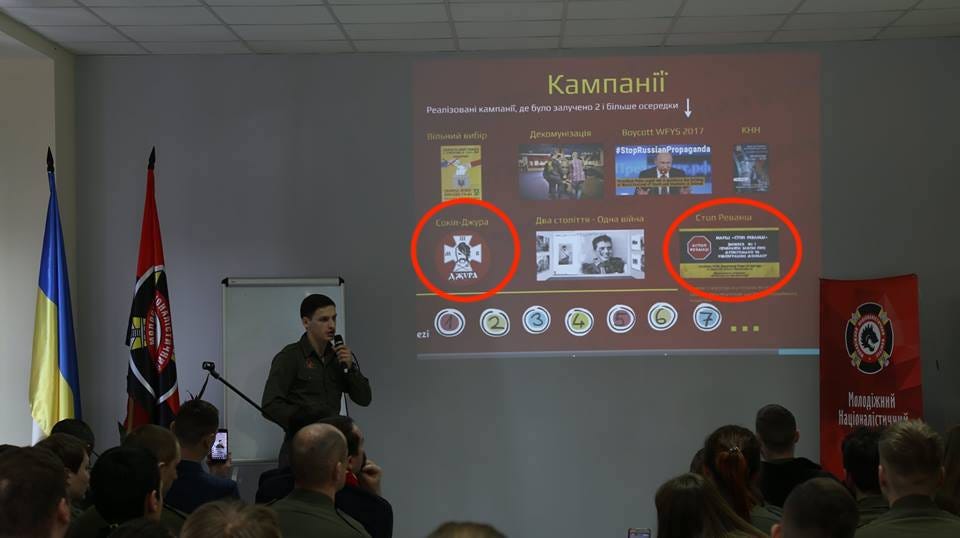
From at least 2016-19, the OUN-B had three “facade structures” in the western-funded Reanimation Package of Reforms Coalition: the TsDVR and a pair of youth organizations: the Ukrainian Youth Association (CYM) and the more militant Youth Nationalist Congress (MNK). The former raised the present-day leaders of the “Bandera Lobby” in the Ukrainian diaspora, and the latter was founded in 2001 to groom the next generation(s) of OUN-B leaders in Ukraine. After they left the RPR Coalition, CYM and MNK co-founded the National Ukrainian Youth Association (NUMO) with the other largest “patriotic” youth groups in Ukraine.
Among them was the far-right National Alliance (NA), which began as an MNK splinter group in the Volyn region. The NA is the principal organizer of the ultra-nationalist Banderstadt (“Bandera city”) festival in Lutsk. For several months in 2019, after the government’s dismissal of OUN-B member Volodymyr Viatrovych, NA co-founder Alina Shpak served as the acting director of the Ukrainian Institute of National Memory. Ihor Kulyk, another NA co-founder, remains in charge of the UINM’s “Archive of National Memory.”
Yuriy Yuzych, the RPR lead expert on youth policy who designed the 1999 “with Bandera into the future” shirts, represented Plast on the NUMO board of directors. Solomiya Farion, the MNK leader who co-authored the OUN-B youth group’s antisemitic “Insurgent Vertep,” was also a founding board member, at a time when the MNK was preparing to launch the far-right “Capitulation Resistance Movement” against Zelensky and the Minsk peace process.
NUMO’s executive director, Olena Podobed-Frankivska, not only used to work for the Banderite TsDVR, but is the RPR Coalition’s manager for youth policy, and at some point became the chief coordinator of the “Civic Sector of Euromaidan.” She married Pavlo Podobed, a fellow former leader of the Kyiv branch of CYM, who came up in Part One as “the OUN-B member who wrote the ‘National Pantheon’ page on the website of the Ukrainian Institute of National Memory.” According to an op-ed in Newsweek, Mr. Podobed, an official in the UINM, has “accused Jews of being the main perpetrators of Soviet crimes against Ukrainians in the 1920s and 1930s.”
Anton Drobovych, described as a “young Ukrainian philosopher,” became the new director of the Ukrainian Institute of National Memory in December 2019. According to Ukrainian journalist Kateryna Iakovlenko, “Viatrovych has described his successor’s appointment as ‘a U-turn’: unlike Vyatrovich, one of the drivers of the move towards decommunisation, Drobovych proposes ‘creative decommunisation’ – in other words, not an eradication of the USSR’s legacy but the creation of new research centres to reinterpret and preserve Ukraine’s Soviet heritage.”
In 2020, the Times of Israel published an optimistic article about Drobovych: “Ukraine’s memory czar tones down glorification of war criminals.” It included a picture of the new UINM director standing next to his Banderite deputy, Volodymyr Tylishchak, and NA co-founder Ihor Kulyk. (Tylishchak is a contributor to the OUN-B newspaper and part of the “Ukrainian Studies of Strategic Research,” which organizes the annual “Bandera Readings” in Kyiv. This event’s chief organizer, Yuriy Syrotiuk, is the OUN-B affiliated director of political education for the far-right Svoboda party, and has been friends with Tylishchak since college.)
Within a year, the author concluded, “I guess that Anton Drobovych hasn’t succeeded, or hasn’t tried, to tone down the glorification of OUN/UPA fighters.” This was after he learned about an online “Virtual Necropolis” sponsored by the UINM that honored individual Nazi collaborators. This project was coordinated by Pavlo Podobed, the head of the UINM’s Department for the Preservation of Places of Memory.
Part One mentioned that the 2020 Ukraine Reform Conference concluded with a panel discussion on national memory. Before that there was a panel on youth policy moderated by NUMO executive director Olena Podobed-Frankivska. Panelists included NUMO board members Yuriy Yuzych and Oleg Slabospitsky, another former leader of the Banderite CYM in Kyiv and co-coordinator of the “Civic Sector of Euromaidan.” In the final panel discussion, UINM director Anton Drobovych appeared alongside Ivan Patryliak, the OUN-B affiliated dean of history at Taras Shevchenko National University, and Yaryna Yasynevch, the Banderite RPR Coalition board member married to Drobovych’s predecessor.
“The course for the future starts from the past,” advised Patryliak, another TsDVR-affiliated RPR expert on national memory, who once cited former KKK Grand Wizard David Duke as an “expert” on the “Jewish Question,” according to historian Per Rudling. Drobovych was only brave enough to say that Ukrainians should seek “the complicated truth about ourselves,” and “it’s not always a good one.”
In the spring of 2021, Anton Drobovych dared to denounce the annual Nazi march in Kyiv to celebrate the establishment of the Ukrainian division of the Waffen-SS in 1943. Meanwhile, Pavlo Podobed, Oleg Slabospitsky, and their friend Roman Kulyk — a far-right activist in the UINM who used to wear neo-Nazi clothing — visited Orest Vaskul, a 94-year old veteran of the Ukrainian SS who died about six weeks later.
Slabospitsky, a board member of NUMO, shamelessly posed the question to himself on Facebook: “Why do I honor the veterans of the [Ukrainian SS] division ‘Halychnya’?” Waffen-SS veteran Orest Vaskul received a state funeral in June 2021. Prominent OUN-B members such as Volodymyr Viatrovych, the former “memory czar,” and Serhiy Kvit, the former Minister of Education and Science, made sure to pay their respects. It turns out that Vaskul led the OUN-B network in Ukraine from 1995 until 2010. Earlier this year, a street in Kyiv was named after him.
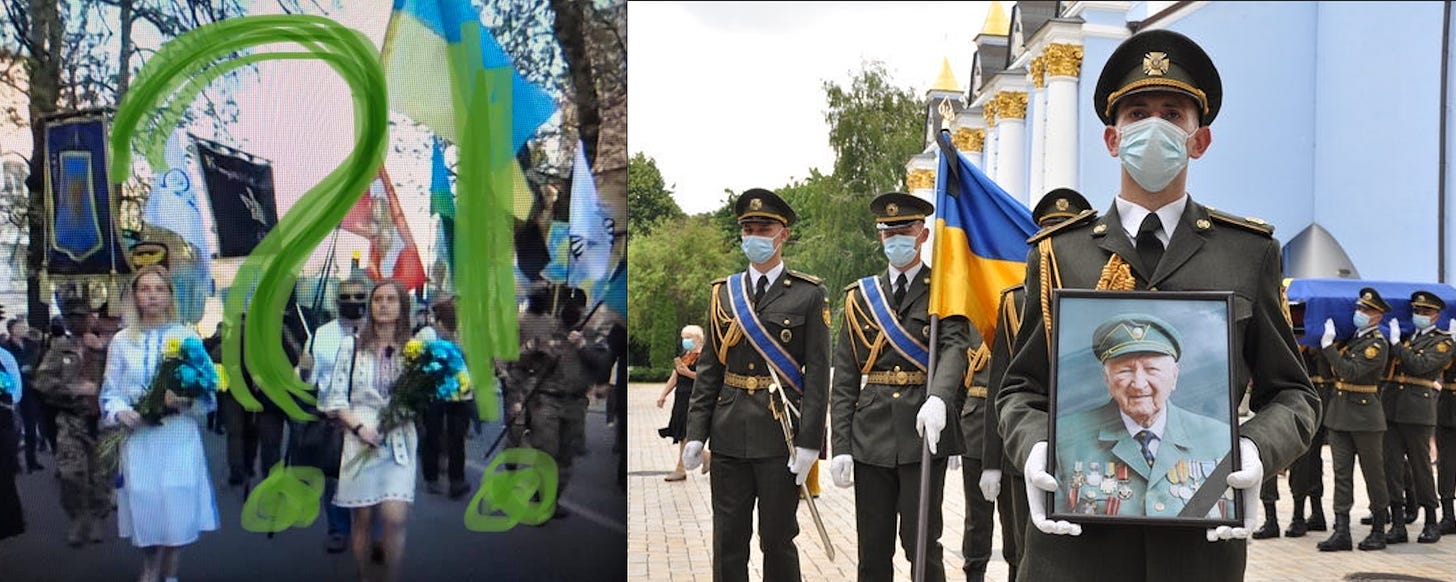
In October 2015, Ukrainian president Petro Poroshenko decreed the formation of a working group on the development of a strategy for national-patriotic education in 2016-20. Poroshenko appointed a significant number of Banderites and other far-right nationalists (including Mykola Lyakhovych and Azov politician Oleg Petrenko). As for the Banderites, there was Yuriy Yuzych, on behalf of Plast; Ulana Suprun, at that point a representative of the OUN-B dominated Ukrainian World Congress, and not yet the acting Healthcare Minister of Ukraine (2016-19); Taras Rondzistyj, as the director of the Stepan Bandera National Revival Center; Olena Podobed-Frankivska, chief coordinator of the Civic Sector of Euromaidan; and Igor Artyushenko, a member of Ukraine’s parliament from 2014-19.
Artyushenko was not on my radar until now. According to his (now defunct) website, since 2011 he has been an official representative of the Stepan Bandera National Revival Center in the Zaporizhzhia region, where he’s led Poroshenko’s party for years. In 2012, he became the regional head of “Ukrainian Affairs,” the potential OUN-B front that organizes conferences on “national-patriotic education,” and subsequently one of the local leaders of the Euromaidan in Zaporizhzhia. Artyushenko has written numerous front-page articles for the OUN-B newspaper. In 2019, he participated in the OUN-B pilgrimage to Bandera’s grave in Munich, and shared an OUN-B statement calling on patriotic Ukrainians to vote for Poroshenko and “against Moscow” (Zelensky). Three years earlier, VoxUkraine ranked him the top #3 reformist in Ukrainian parliament, with #1 being National Alliance co-founder Ihor Huz, a former member of the OUN-B’s Youth Nationalist Congress who hired a neo-Nazi leader as one of his aides.
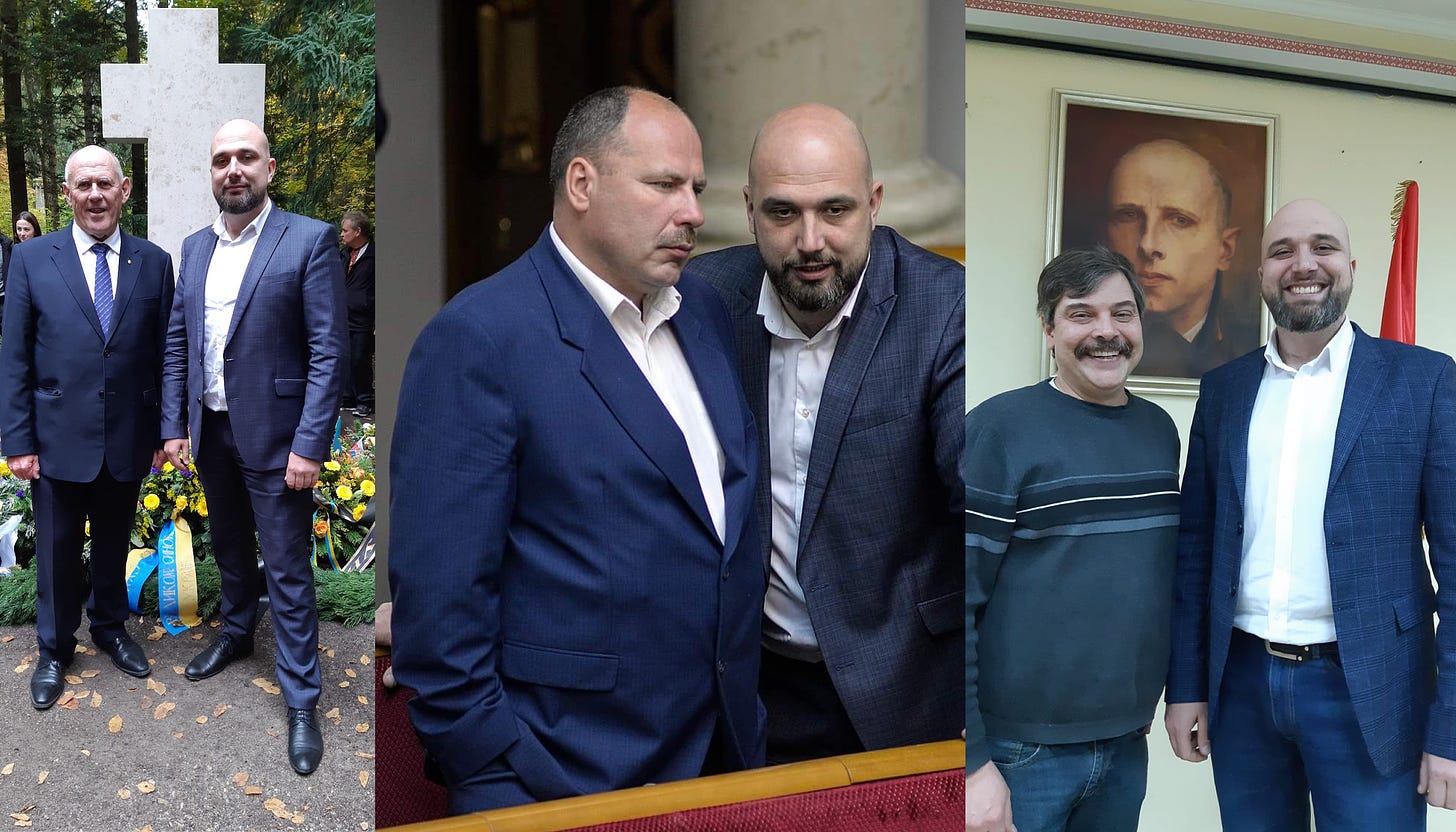
The next (and for now, final) installment of this series will take a closer look at the OUN-B’s Center for Research of the Liberation Movement.



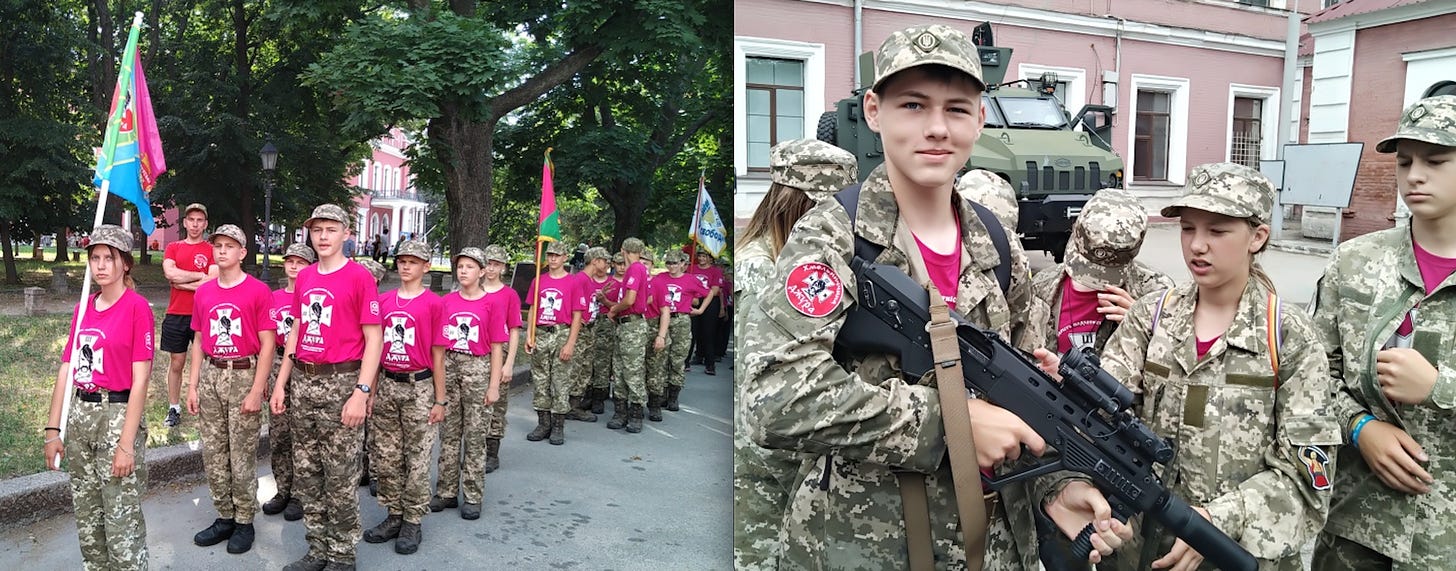
Moss - I look forward to speaking with you about your posts and articles. It’s my belief that there is much disinformation and I would be happy to clarify. Having been raised in the Ukrainian community I assure you I was never encouraged to join any nazi organization.